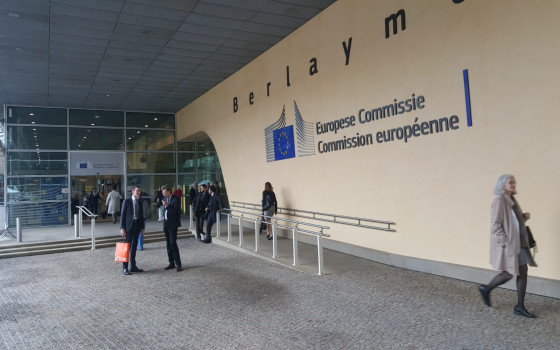
A new step to double the share of recycled materials in the EU economy, making it a global leader in the circular economy.. Digitizing and classifying waste shipments and focusing on electrical and electronic materials

- Europe and Arabs
- Wednesday , 2 July 2025 14:36 PM GMT
Brussels: Europe and the Arabs
The Commission launched several initiatives on Wednesday to accelerate the European Union's transition to a circular economy and pave the way for the Circular Economy Law, expected to be issued in 2026. The circular economy enhances competitiveness and economic growth by encouraging the reuse, recycling, and remanufacturing of materials. The anticipated law will support the EU's objectives under the Competitiveness Compass and the Clean Industrial Deal to double the share of recycled materials in the EU economy and become a global leader in the circular economy by 2030.
According to a statement issued by the Commission's headquarters in Brussels, a strategic dialogue on the circular economy will be held today, accompanied by a set of new measures. The initiatives adopted today include waste shipping rules and an assessment of e-waste legislation. In addition, new rules to improve recycling efficiency and recover materials from waste batteries will be published in the coming days. The dialogue will also launch a public consultation with stakeholders and invite submissions soon. These new measures address various dimensions of the circular economy and will help advance the transition process and strengthen the implementation of existing legislation. Digitization and Classification of Waste Shipments
The Commission will implement a digital waste shipment system. This system will enable companies to move from paper-based to digital procedures for waste shipments across the EU Single Market, reducing administrative burdens and contributing to increased competitiveness. This system will simplify cross-border waste shipments within the EU, while protecting human health and the environment. From 21 May 2026, paper-based procedures will be fully replaced by digital systems, streamlining processes, improving traceability, and reducing illegal shipments. By digitizing these procedures, waste will be recycled in the most efficient facilities in all Member States.
In parallel, the Commission has launched a public consultation on harmonizing the classification of certain types of waste (so-called "green-listed" waste) to facilitate their cross-border shipments. This consultation is accessible through the "Have Your Opinion" portal until 31 October 2025.
Evaluation of the Waste Electrical and Electronic Equipment Directive
The Commission today published an evaluation of the Waste Electrical and Electronic Equipment (WEEE) Directive. The Waste Electrical and Electronic Equipment (WEEE) Directive is crucial to addressing the growing challenges in e-waste management and better aligning EU rules with the objectives of a competitive circular economy. Key gaps have been identified, such as the fact that nearly 50% of total e-waste remains uncollected and that recycling falls short of EU Member States' collection targets. E-waste is one of the fastest-growing waste sources in Europe, increasing by around 2% per year. There is significant potential to improve the use of e-waste, for example through the recovery and recycling of primary raw materials and the promotion of a circular economy. The assessment also highlights the need for a new approach to improving e-waste collection, treatment, and market incentives and will inform the Commission's proposal to revise the WEEE Directive. This revision will be a key component of future circular economy legislation.
The feedback from today's dialogue, consultations, and assessment of the WEEE Directive will inform the development of circular economy legislation and contribute to advancing the EU's transition to a circular economy. In addition, later this week, the Commission intends to adopt new rules to improve recycling efficiency and recover materials from batteries.
Further consultations with stakeholders will be conducted through a public consultation process.
EU manufacturers typically spend more than twice as much on materials as they do on labor or energy. Many EU companies also rely on imports of essential materials from third countries, leaving them vulnerable to price fluctuations and supply shortages. Circular practices that promote resource efficiency, design, and recycling can mitigate these risks while lowering costs. Furthermore, circular solutions are vital to achieving climate neutrality by 2050, as they can achieve between 20% and 25% of the necessary reductions in greenhouse gas emissions.












No Comments Found